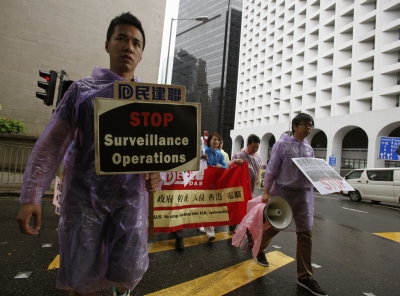 China on Monday joined the growing international chorus in demanding an explanation from the United States over its controversial surveillance programmes, which had collected troves of information by tracking millions of telephone records and Internet activity globally.
China on Monday joined the growing international chorus in demanding an explanation from the United States over its controversial surveillance programmes, which had collected troves of information by tracking millions of telephone records and Internet activity globally.
"We believe that the US side should pay attention to concerns and demand of international community and public over this issue and give a necessary explanation," Chinese foreign ministry spokeswoman Hua Chunying told reporters in Beijing. She made the remarks when asked whether China has sought explanation from the US as some countries like Germany and
Japan have demanded details on its National Security Agency's PRISM surveillance programmes.
India has also taken up with the US the reports that it was the fifth most tracked country by the American intelligence using a secret data-mining programme to monitor worldwide Internet data and sought further details in this regard.
China also refuted the allegations as "groundless" that former US intelligence contractor and Central Investigation Agency employee Edward Snowden spied for it before defecting to Hong Kong, as state media called for his asylum saying that his extradition would result in "loss of face" for Beijing.
"I think it is completely groundless," Hua said, dismissing allegations by former US vice president Dick Cheney that Snowden could be spying for Beijing. Cheney told US television that he was "deeply suspicious" about Snowden as the CIA employee.
Snowden, who had also alleged US cyber attacks on China thus reinforcing Beijing's claims, chose to go to Hong Kong, the former British colony which functioned under the Chinese government though it has some administrative autonomy. The 29-year-old former CIA employee defected to Hong Kong on May 20 and since then has given media interviews reinforcing China's allegations in the past that it was a victim of hacker attacks from the US.
"That's not a place where you ordinarily want to go if you're interested in freedom, and liberty and so forth," Cheney told US television channels.
"So, it raises questions whether or not he had that kind of connection before he did this," he said.
So far China has not officially commented about Snowden's entry into Hong Kong other than saying that it has taken note of the reports. About demonstration in Hong Kong against extradition of Snowden to the US, Hua said China has taken note of the reports in this regard.
The US has launched a criminal investigation into Snowden, but has yet to file a formal extradition request to Hong Kong authorities. Hong Kong has an extradition treaty with the US, but Snowden argues that his defection was more of apolitical reasons not criminal as stated in the extradition treaty.
Meanwhile, state-run daily the Global Times said in an editorial that any move by China and Hong Kong government to extradite Snowden back to the US would be "unwise" as it would result in "loss for face" for Beijing.
"Washington must be grinding its teeth because Snowden's revelations have almost overturned the image of the US as the defender of a free Internet.
After losing this image, which has been abused by the US government to boss others around, there is no way it won't want Snowden to be extradited," the editorial said. "However, it would be a face-losing outcome for both the Hong Kong special administrative region government and the Chinese central government if Snowden is extradited back to the US. Unlike a common criminal, Snowden did not hurt anybody.
"The consequences of extraditing Snowden back to the US would be more troublesome than the alternative, because the local reaction would bring more trouble to Hong Kong and the Chinese mainland," it said.
"Extraditing Snowden back to the US would not only be a betrayal of Snowden's trust, but a disappointment for expectations around the world.
China's growing power is attracting people to seek asylum in China. This is unavoidable and should be used to accumulate moral standing," it said.
"The 'no comment' attitude of the Chinese central government and the ambiguous statements from the Hong Kong administration are the proper responses. China should follow public opinion and safeguard its interests," it said.
Snowden's crime is that he blew the whistle on the US government's violation of civil rights, it said adding that his action supported "human rights" as defined in the United Nations Charter, and has been applauded worldwide," it said.
Image: rotesters from the pro-Beijing party, Democratic Alliance for the Betterment of Hong Kong, march to the US consulate in Hong Kong | Photograph: Bobby Yip/Reuters









